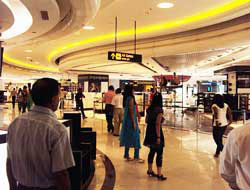
New Delhi, April 22: Delhi airport is one of the biggest employers in the world providing jobs to more than five lakh people, a study by the National Council of Applied Economic Research (NCAER) has found.
"The airport provides direct employment to about 5.16 lakh people, 18 per cent more than next best Hartsfield- Jackson Atlanta International airport in the US.
"The employment at Delhi airport is 0.11 per cent of national employment and 8.47 per cent of jobs in the state," said the first of its kind study in India to assess the impact of IGI Airport on employment and economic development of Delhi and the country.
If indirect jobs generated due to the operationalisation of Terminal 3 of the Delhi airport were added, the total employment comes to 15.77 lakh which is 0.34 per cent of national employment and 25.9 per cent of Delhi's jobs, the study found.
The Indira Gandhi International airport has been developed and run by GMR-led consortium, the Delhi International Airport Limited (DIAL).
The think tank compared IGI airport with 11 other international airports in the world where similar studies have been carried out over the years.
Besides Atlanta, other airports considered in the study include Bradley, Budapest, Sydney, Hong Kong, Kansas, New York State, Virginia, Miami, Dubai and Detroit.
Five of these airports had provided employment to less than a lakh people while the rest had a contribution of less than four lakh to employment, the NCAER study found.
During construction of Terminal 3 (T3) of Delhi airport, about 6.14 lakh people got the direct and indirect jobs.
In terms of percentage, it is 0.131 per cent of national employment and 10.08 per cent of annual employment in Delhi.
The employment generation due to construction activities is a one time effect unlike the employment effect of airport services which are recurring in nature, the study said.





Comments
Add new comment